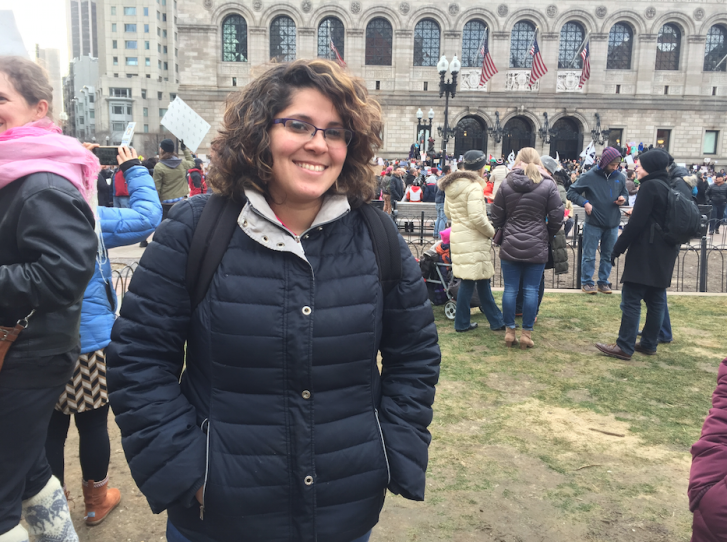Getting a handle on what a protest is about is elusive. Can what thousands of people think be accurately conveyed in headline, or even a sentence? Thousands of people gathered in Copley Square on Sunday afternoon to protest Donald Trump's executive order banning people from seven predominantly-Muslim countries from entering the United States for at least three months. But they were also in favor of certain principles.
WGBH News was on hand to talk with protesters about what motivated them to attend. Here is a series of snapshots of the crowd.

Cynthia Koskela's father immigrated to the United States from Mexico when he was 17 years old. Today, she's a student at the Harvard Graduate School of Education.
"I contribute to this society, and I think it's important to share these stories and let people know America is not one face or one nationality or one religion. America is diverse," she said.
But Koskela said the charged national rhetoric around immigration has divided the community where she grew up in Texas.
"When I went to visit my parents in Texas a couple months ago, my mom and I were excited to see each other, speaking in Spanish, really happy," she said. "A woman in front of me said to a gentleman, 'When are they going to build that wall?' It really hurt. That's a grocery store I went to growing up. I grew up around these people."

Elijah Childs is a Boston resident who works in high-tech printing and production. He held a sign that said "Visa Denied" above a photograph of Anne Frank—the famous Jewish diarist murdered by the Nazis, whose family desperately tried and failed to gain entry to the U.S. as refugees.
"There's a Bible verse I was raised with that says 'to him who knows to do good and does not do it, it is sin,'" Childs said.
"I don't want to be able to talk to my grandchildren and [when they] say, 'what were you doing when they were rounding up people?...and say, 'Oh, it didn't affect me, so I stayed home and played video games," he said.

Faras Smadi's sister and her family still live in Syria, and he and his wife Elvira DeLuca have been applying for humanitarian visas the last couple of years to bring them to the United States.
"Every time he applies, he gets a form letter of a couple of sentences saying that our request did not meet the requirements of expedited service," said DeLuca. "I'm not really sure what would be considered humanitarian reasons, if not being stuck in a war-torn country."
"One wise man said, 'the one thing necessary for the triumph of evil is for good men to do nothing,'" Smadi said. "We are here to make a little difference, just by standing here with all these people who came here to fight injustice and inequality."

John Affleck of Quincy said he was escorting his son, Charlie, to his first ever protest. Charlie's mother attended the Women's March on Washington, D.C. last week.
"My wife is Jewish, and my children are Jewish, and every time I say that I shiver a little bit to think that once upon a time we couldn't have said that," Affleck explains.
"We're very upset about what we consider to be a very un-American move by our government. We want to oppose it any way we can and express that all people are welcome here," he said.

Hubert Vale also brought his child, Matt O'Conn-Vale, to the protest.
"I'm of Cuban descent," Vale said. "My parents immigrated to the United States in the early '60s. I feel very blessed to have grown up in a country where immigrants are welcomed and valued."
"Having adopted a child from China, it means even more to us than ever," he continued.
"Without immigrants, America wouldn't exist," O'Conn-Vale said.

Two dogs wearing signs saying 'Good boy against the Muslim ban' didn't have much to say to our roving correspondent. But their human companion, Colleen Armstrong, said she wanted her attendance at the rally to send a message to Washington.
"What Trump is doing is not okay," she said. "It's discriminatory and unconstitutional. We're going to keep showing up and remind him: we're all still here."




